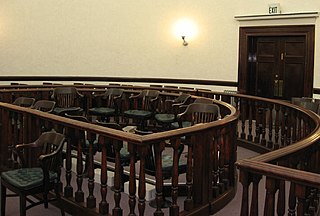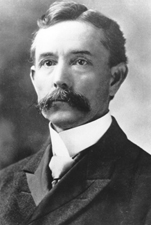In jurisprudence, double jeopardy is a procedural defence that prevents an accused person from being tried again on the same charges following an acquittal or conviction and in rare cases prosecutorial and/or judge misconduct in the same jurisdiction. Double jeopardy is a common concept in criminal law – in civil law, a similar concept is that of res judicata. The double jeopardy protection in criminal prosecutions only bars an identical prosecution for the same offence, however, a different offence may be charged on identical evidence at a second trial. Res judicata protection is stronger – it precludes any causes of action or claims that arise from a previously litigated subject matter.

A jury trial, or trial by jury, is a legal proceeding in which a jury makes a decision or findings of fact. It is distinguished from a bench trial in which a judge or panel of judges makes all decisions.

A jury is a sworn body of people (jurors) convened to hear evidence, make findings of fact, and render an impartial verdict officially submitted to them by a court, or to set a penalty or judgment.
Jury nullification, also known in the United Kingdom as jury equity or a perverse verdict, is when the jury in a criminal trial gives a verdict of not guilty even though they think a defendant has broken the law. The jury's reasons may include the belief that the law itself is unjust, that the prosecutor has misapplied the law in the defendant's case, that the punishment for breaking the law is too harsh, or general frustrations with the criminal justice system. Some juries have also refused to convict due to their own prejudices in favor of the defendant. Such verdicts are possible because a jury has an absolute right to return any verdict it chooses.
A hybrid offence, dual offence, Crown option offence, dual procedure offence, offence triable either way, or wobbler is one of the special class offences in the common law jurisdictions where the case may be prosecuted either summarily or on indictment. In the United States, an alternative misdemeanor/felony offense lists both county jail and state prison as possible punishment, for example, theft. Similarly, a wobblette is a crime that can be charged either as a misdemeanor or an infraction, for example, in California, violating COVID-19 safety precautions.
Nolle prosequi, abbreviated nol or nolle pros, is legal Latin meaning "to be unwilling to pursue". It is a type of prosecutorial discretion in common law, used for prosecutors' declarations that they are voluntarily ending a criminal case before trial or before a verdict is rendered; it is a kind of motion to dismiss and contrasts with an involuntary dismissal.
Moore et al. v. Dempsey, 261 U.S. 86 (1923), was a United States Supreme Court case in which the Court ruled 6–2 that the defendants' mob-dominated trials deprived them of due process guaranteed by the Due Process Clause of the Fourteenth Amendment. It reversed the district court's decision declining the petitioners' writ of habeas corpus. This case was a precedent for the Supreme Court's review of state criminal trials in terms of their compliance with the Bill of Rights.
The Liberty City Seven were seven construction workers and members of a small Miami, Florida-based religious group who called themselves the Universal Divine Saviors. Described as a "bizarre cult," the seven were arrested and charged with terrorism-related offenses in 2006 by a Federal Bureau of Investigation sting investigation although their actual operational capability was extremely low and their intentions were unclear. The members of the group operated out of a small warehouse in the Miami neighborhood of Liberty City.
The Jeanine Nicarico murder case was a complex and influential homicide investigation and prosecution in which two men, Rolando Cruz and Alejandro Hernandez, both Latinos, were wrongfully convicted of abduction, rape and murder in 1985 in DuPage County, Illinois. They were both sentenced to death. The case was scrutinized during appeals for being weak in evidence.

The court of assizes is the trial court which tries the most serious crimes in the judicial system of Belgium. It is the highest Belgian court with criminal jurisdiction; as such, it is the only Belgian court that can sentence someone to life imprisonment. The courts of assizes are not permanent courts; a new court of assizes is assembled for each new trial. There is a court of assizes in each of the ten provinces of Belgium, as well as one in the arrondissement of Brussels-Capital which is not part of any province. Further below, an overview is provided of the eleven courts of assizes and their seats. They are the only courts in Belgium for which the provinces are used as territorial subdivisions. They are also the only courts in Belgium that hold jury trials. The jury acts as sole trier of fact, but decides on the penalty together with the judges. The trial by jury of certain crimes is laid down in article 150 of the Belgian Constitution. The Belgian courts of assizes have the same origin as their French namesakes.
No case for the defendant to answer is a term in the criminal law of some Commonwealth states, whereby a defendant seeks acquittal without having to present a defence, because of the insufficiency of the prosecution's case. The motion is infrequently used in civil cases where the defendant asserts that the plaintiff's case is insufficient to prove liability.
In the United States, jury nullification occurs when a jury in a criminal case reaches a verdict contrary to the weight of evidence, sometimes because of a disagreement with the relevant law. It has its origins in colonial America under British law. The American jury draws its power of nullification from its right to render a general verdict in criminal trials, the inability of criminal courts to direct a verdict no matter how strong the evidence, the Fifth Amendment's Double Jeopardy Clause, which prohibits the appeal of an acquittal, and the fact that jurors cannot be punished for the verdict they return.
The Double Jeopardy Clause of the Fifth Amendment to the United States Constitution provides: "[N]or shall any person be subject for the same offence to be twice put in jeopardy of life or limb..." The four essential protections included are prohibitions against, for the same offense:
A citizen's right to a trial by jury is a central feature of the United States Constitution. It is considered a fundamental principle of the American legal system.
Glasser v. United States, 315 U.S. 60 (1942), was a landmark decision of the US Supreme Court on two issues of constitutional criminal procedure. Glasser was the first Supreme Court decision to hold that the Assistance of Counsel Clause of the Sixth Amendment required the reversal of a criminal defendant's conviction if his lawyer's representation of him was limited by a conflict of interest.

Burton v. United States is the name of two appeals to the Supreme Court of the United States by Senator Joseph R. Burton (R-KS) following his conviction for compensated representation of a party in a proceeding in which the United States was interested: Burton v. United States, 196 U.S. 283 (1905) and Burton v. United States, 202 U.S. 344 (1906). Burton was convicted of acting as counsel to Rialto Grain and Securities Company in the United States Postmaster General's investigation of Rialto for mail fraud.

Republic of Texas v. Inglish, Dallam 608 (1844), was a case decided by the Supreme Court of the Republic of Texas which held that to be a valid claim for land, the land claim must have been authorized by the constitution after March 2, 1836; or by authority under Mexican law prior to that date.

The Supreme Court of the Republic of Texas was the court of last resort for legal matters in the Republic of Texas from the Republic's independence from Mexico in 1836 until its annexation by the United States of America in 1846. The current Supreme Court of Texas was established that year.

Republic v. Bynum, Dallam 376 (1844), was a case decided by the Supreme Court of the Republic of Texas which held that uncertainty in the description of the offense charged in the indictment requires that the person be discharged from custody. The Court issued a writ of habeas corpus to order the release of the prisoner.





